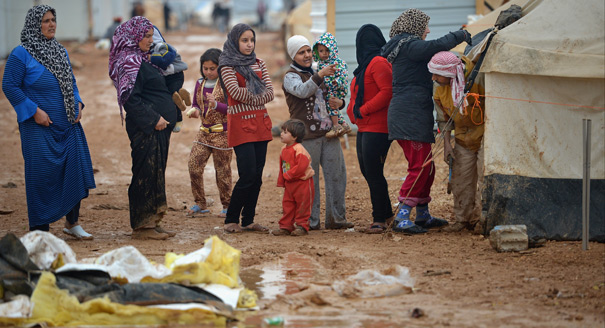- +18
James M. Acton, Saskia Brechenmacher, Cecily Brewer, …

Source: Getty
Helping Jordan Weather the Syrian Storm
Embroiled in the spillover from the Syrian conflict, Jordan faces an enormous challenge. The country must focus on political and economic reforms, and needs outside help, too.
By virtue of its geography and history, Jordan always has been a fragile country. Its economy has few solid fundamentals, its social and political system is immensely complex, and a slow reform process is under way.
Inevitably confronted with the consequences of the Syrian revolution next door, first and foremost through a tsunami of refugees flooding across its northern border, Jordan now faces an unprecedented and multifaceted challenge. It needs vision and courage—as well as a lot of outside support—to weather the Syrian storm.
The Immediate Impact
In Jordan, in the midst of the transformations across the Arab world, one is immediately struck by the overwhelming consequences of the revolution in Syria. Even before landing in Amman, whether traveling from Beirut, Istanbul, or anywhere to the west of the country, a visitor can appreciate the extent of the ramifications: flights cannot pass over Syria, Israeli airspace is closed to through traffic, and the detour over the Sinai Peninsula and Aqaba adds one hour to flights into and out of Jordan. For airlines, the Syrian revolution means an extra fuel bill.Once in Amman, it is impossible to start any discussion without talking about the effects of the Syrian revolution—and rightly so. According to the most reasonable estimates, Jordan now hosts 700,000–800,000 Syrian refugees, amounting to a staggering 11–12 percent of Jordan’s total population. By comparison, Syrian refugees in Turkey represent at most 0.5 percent of Turkey’s population. In parts of Jordan’s northern region, Syrian refugees make up more than half of the local population. Some 150,000 of those refugees live in camps, while the others are living in rented accommodations or with relatives.
The daily influx of refugees has increased dramatically. At current rates, the Jordanian government estimates that the number of refugees will reach 1 million by the end of 2013.
The consequences on Jordan’s economy and social fabric have been significant. Hospitals are kept busy with wounded Syrians, and schools are hosting Syrian pupils. The dire water restrictions in northern Jordan are allegedly less severe in the camps than in surrounding towns. The cost of rent has increased under pressure from the influx of refugees, and the labor market is suffering from cheap offers from Syrian workers desperate to sustain their families.
There is also a psychological impact. In the past, Jordan has accommodated Palestinian and Iraqi refugees, while Syria was perceived by Jordanians as rock solid. Now, Syria is engulfed in a hitherto-unconceivable revolution, and its desperate people flock to Jordan.
The Syrian revolution has massive security implications for Jordan as well. Not only must refugees entering the country be carefully screened in order to detect potential troublemakers (fears of the Syrian regime trying to destabilize Jordan are real), but large-scale military operations in the Deraa and Suwayda regions—both cradles of the Syrian revolution—might trigger a disruptive wave of panicked refugees. It is in the nature of the Syrian regime to try and export trouble to neighboring countries as the situation within Syria becomes more and more untenable.
Fragile Domestic Reforms
Jordanian society faces a whole range of problems beyond refugee and security issues. Before the Syrian revolution entered its current, acute phase, Jordan had, slowly and painfully, started along the path of economic and political reform. The process is by nature an uneasy one, given the structure of the Jordanian parliament and the regulations governing its work. Jordan’s political life revolves around its peculiar social fabric and society’s vested interests.
But that process is at risk. The worst possible outcome of the Syrian revolution would be a temptation to delay or block the economic and political reforms that Jordan needs in order to deal with the crisis at hand.
A significant incident took place in mid-May in Amman. The parliament was up in arms about the government’s refusal to recall Jordan’s ambassador from Israel after the Israeli Air Force bombed army infrastructure near Damascus on May 11 and proposed a motion of defiance. As legitimate as such emotions may be, they must not derail the process of reforming the Jordanian system. A display of national cohesion in the face of the Syrian storm is far more important at this point than political games.
Jordan must focus on its multifaceted path to reform. A more inclusive economic model is needed—itself a challenging task because of vested interests. The promising start made in the latest parliamentary elections, when 27 of the 150 seats were filled through a national vote, needs to be gradually expanded to a true political-party culture. The Arab Spring experience in other countries makes such an evolution essential, and Jordan’s King Abdullah II is fully aware of the need for the country to move forward.
Yet, there is resistance too, as well as fear of the rise of Islamist parties. Whether the Jordanian elite will see the Arab Spring as an opportunity to change the country’s economic policy and reform its political system is the key factor.
Moving Forward
In confronting the consequences of the Syrian revolution, Jordan, together with its allies, has taken security precautions. Massive military maneuvers will soon be held along the lines of the 2012 operation Eager Lion, which involved close to 12,000 soldiers from nineteen countries.
Jordan has also stepped up its diplomatic efforts, including intensified contacts during the past few weeks with Iran, Russia, Turkey, and the United States, and soon with the EU. Whether or not Jordan is involved in the “Geneva II” conference aimed at identifying a way forward in the Syrian crisis, Amman will want its position and interests to be duly represented in the talks. This is only legitimate.
The Jordanian people have so far extended a formidable welcome to the Syrian refugees, but there are mounting signs of “refugee fatigue” and even some indications of rejection. The national and international effort to host the refugees has been remarkable, and international help has recently been increasing. An IMF loan to Jordan is being implemented and EU macroeconomic assistance is on its way.
But more is needed. The Jordanian Ministry of Planning estimates that the country needs $500 million in 2013 to cover the direct costs incurred as a result of the Syrian crisis. Indirect costs are difficult to estimate.
And different requirements have to be met, in particular local towns and communities under stress because of the refugee crisis and the overuse of local infrastructure must be taken care of. EU Commissioner for Humanitarian Aid and Crisis Response Kristalina Georgieva, who visited Jordan on May 11–12, expressed an awareness of such a need to rebalance assistance.
The EU and other donors need to continue increasing their assistance to Syrian refugees in Jordan and add an aid component for the Jordanian population in the affected territory as well. The international community cannot afford to ignore the socioeconomic consequences of the Syrian revolution on Jordan and its potentially destructive effects on Jordanian society.
Usually, large-scale humanitarian emergencies trigger a substantial effort from UN and Western agencies as well as Western NGOs. This time, it is imperative that donors take full account of the serious consequences of the Syrian crisis on Jordan.
Jordan should be strongly comforted by its allies in terms of humanitarian aid, macroeconomic assistance, and political support, and it should press ahead with indispensable economic and political reforms. These reforms are warranted by the changing regional environment, not just by the Syrian storm.
About the Author

Senior Fellow, Carnegie Europe
Pierini is a senior fellow at Carnegie Europe, where his research focuses on developments in the Middle East and Turkey from a European perspective.
- Unpacking Trump’s National Security StrategyOther
- Europe’s American PredicamentCommentary
Marc Pierini
Recent Work
More Work from Carnegie Endowment for International Peace
- What We Know About Drone Use in the Iran WarCommentary
Two experts discuss how drone technology is shaping yet another conflict and what the United States can learn from Ukraine.
Steve Feldstein, Dara Massicot
- Beijing Doesn’t Think Like Washington—and the Iran Conflict Shows WhyCommentary
Arguing that Chinese policy is hung on alliances—with imputations of obligation—misses the point.
Evan A. Feigenbaum
- Axis of Resistance or Suicide?Commentary
As Iran defends its interests in the region and its regime’s survival, it may push Hezbollah into the abyss.
Michael Young
- How Far Can Russian Arms Help Iran?Commentary
Arms supplies from Russia to Iran will not only continue, but could grow significantly if Russia gets the opportunity.
Nikita Smagin
- Is a Conflict-Ending Solution Even Possible in Ukraine?Commentary
On the fourth anniversary of Russia’s full-scale invasion, Carnegie experts discuss the war’s impacts and what might come next.
- +1
Eric Ciaramella, Aaron David Miller, Alexandra Prokopenko, …















